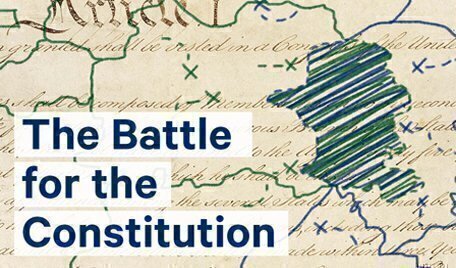Below is a round-up of the latest from the “Battle for the Constitution:” a special project on the constitutional debates in American life, in partnership with The Atlantic.
 This is A Trial of the Constitution Itself
This is A Trial of the Constitution Itself
By Maya Wiley, University Professor, The New School
Maya Wiley asserts that the impeachment trial of Donald Trump is a test of the Constitution and the way it allocates foreign policy power between the executive and legislative branches—and that to accept the president’s behavior will further empower the executive and diminish Congress’ oversight functions.
Due Process Rights Don’t Apply in an Impeachment Trial
By Greg Weiner, Provost, Academic Vice President, and Associate Professor of Political Science, Assumption College
Greg Weiner explains that the Due Process Clauses of the Fifth and 14th Amendments do not apply to an impeachment trial because the presidency is not a private right of “life, liberty, or property” controlled by the president, but an office temporarily bestowed upon an individual by the public.
By Garrett Epps, Professor of Law, University of Baltimore
Garrett Epps writes about Espinoza v. Montana Department of Revenue, a case that asks, if a state law allows funding for education but excludes religious schools, does that violate the Religion Clauses and Equal Protection Clause? Given that the Montana Supreme Court already invalidated the program in question and because he believes the historical evidence of discrimination in the provision in question is unclear, Epps says the case against Montana is weak.
Trump’s Defense Against Subpoenas Makes No Legal Sense
By Frank O. Bowman III, Floyd R. Gibson Missouri Endowed Professor of Law, University of Missouri School of Law
Frank O. Bowman III argues that the theories used by Donald Trump’s defense team are not grounded in law and create a dangerous precedent for future presidents to completely obstruct congressional oversight of the executive branch.
Stop the Impeachment Polling Madness
By Jane Chong, Lawyer at Williams & Connolly
Jane Chong contends that polls should have no bearing on impeachment because the decision to impeach should be focused on if the president’s actions rise to the level of “Treason, Bribery, or other high Crimes and Misdemeanors.”
The Case Against Impeachment Has Nothing to Do With Impeachment
By Lawrence Goldstone, author of multiple books including, Inherently Unequal: The Betrayal of Equal Rights by the Supreme Court, 1865-1903 and The Activist: John Marshall, Marbury v. Madison, and the Myth of Judicial Review
Lawrence Goldstone argues that the defense against Donald Trump’s impeachment follows in a long history, beginning with slavery at the Founding to certain laws today, underlined by efforts of some to maintain white minority power.
The Founders Set an Extremely High Bar for Impeachment
By Margaret Taylor, Fellow in Governance Studies, Brookings Institution and Senior Editor and Counsel, Lawfare
Margaret Taylor writes that a very high bar for impeachment is good because if it were lower Congress would hold too much power over the president and there would be too much instability in the government. At the same time, she fears factionalism is a threat to our constitutional order.







